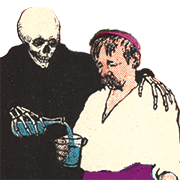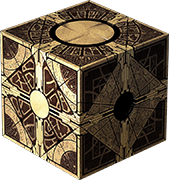|
PurpleXVI posted:Something I experimented with once, was the idea that there's no such thing as combat or non-combat powers, and every combat power also has a non-combat effect, whether it's a passive + to doing Strong Things when you know the Megapunch(because you can't throw the Megapunch without having done a lot of working out) or that Bones To Ants Spell can be used to slip through narrow spaces after turning your own bones to ants(and then undoing it afterwards).
|
|
|
|

|
| # ? May 8, 2024 20:32 |
|
Yeah, I'm probably holding onto the expectations that more standard OSR players might bring to the game a little too tightly. Probably trying to cater to that audience and their assumptions too much, and that's keeping me from trying something more interesting. A small dice pool mechanic to introduce tiered results might be a good option, combined with using tiers and associated effects for NPC stats like Splicer suggested.PurpleXVI posted:I couldn't quite get it to work for the game I was doing it for, but I feel like it's a solution to the idea of some characters being combat specialized and others being non-combat specialized. Splicer posted:You don't even have to make it a power aspect because you can just deliver everything in packages.
|
|
|
|
Splicer posted:My basic suggestion would be to replace roll-to-hit with roll-for-consequences. If you swing an axe at a goblin you always cause X combatwinpoints, the question is whether you leave yourself open or not. You can also stack on some side bonuses, like "roll a 1, get +2 damage but take a star". I've been toying around with a Forged In The Dark/Into The Odd mashup that does some stuff like this. Basically, players get three actions per turn: a basic "roll to attack", a move, and an action. The roll to attack works like in ItO--you just pick a target and roll damage against them--that's it, you basically always can do that no matter what else you're doing that round (the one exception would be certain spells). The action can then just be anything that isn't another attack--you could use an item, throw a potion, pick a lock, pull a teammate to safety, whatever. You can even use it to make your basic attack fancy in some way--you can add a shove effect or a taunt or whatever to your attack by using your action on it. The catch is, risky actions require you to make a FitD-style roll. You can attack the goblin with no extra risk, but unless you have some special ability adding a shove to the attack means you have to roll for it and can get the classic FitD results: failure with complication, success with complication, or success without complication. Same with risky non-attack options. Then, on enemy turn each enemy gets to cause problems in their own way--by default by just attacking you. Each player has to make a save against their attack, generally taking damage OR a status effect on a partial success or taking both on a full failure. Complications from failed combat rolls can be anything, but the default option is close to what's been said here--you put the player in a 'vulnerable' position and ramp up the power of their next move against them unless one of their teammates can save them. JMBosch posted:Yeah, I'm probably holding onto the expectations that more standard OSR players might bring to the game a little too tightly. Probably trying to cater to that audience and their assumptions too much, and that's keeping me from trying something more interesting. A small dice pool mechanic to introduce tiered results might be a good option, combined with using tiers and associated effects for NPC stats like Splicer suggested. This is pretty much what I was coming to say--the mechanic is pretty dissociated at its core and will turn off a certain crowd no matter how it goes, so just own that. Genres like OSR can be useful marketing flags, but shouldn't be constraining your design like that. Just let the game be what it is
|
|
|
|
So, Iím brainstorming a new campaign-style system, but wanted to survey this thread on a few basic mechanics. This might just be everyoneís personal opinion, but: 1. Do people really enjoy rolling-to-hit in D&D and other tactically-oriented games? If yes, do people feel more viscerally excited by rolling a 20-sider and critíing vs. using other polyhedrals? 2. Are there any games that do advancement well while limiting HP or health bloat? Iím trying to figure out how to introduce progressively more challenging enemies without making fights a long slog. 3. Have you seen abstracted currency systems in high fantasy games that work really well (i.e. Blades in the Darkís Coin system?) 4. Do you/your players find separate resolution mechanics useful for different modes of play? (I.e. ICON using FitD mechanics for narrative play and D20 resolution mechanics for tactical play) Iíll probably have a ton more questions, but wanted to see if Iím missing any major mechanical trends in games.
|
|
|
|
Gray Ghost posted:So, Iím brainstorming a new campaign-style system, but wanted to survey this thread on a few basic mechanics. This might just be everyoneís personal opinion, but: I did like the narrative dice in FFG Star Wars. Itís just one roll, not separate hit and damage. You can still miss, but it usually comes with a positive side effect. You also got that ďhooray, a crit!Ē feeling if the triumph symbol shows up. It was the same system for all checks, not just combat. I donít remember health bloat in particular but you eventually got so good at your skills that it was hard to fail, and that was pretty boring.
|
|
|
|
I just want to sing praises for Wildsea here. For the most part it's a pretty bog-standard FitD-adjacent game, but it has a cool way of combining "Fate Aspects" and "PbtA Abilities" into a thing called Aspects, and then ties your hitpoints to those hit points. It makes the abilities ablative in a way I haven't really seen before. Both players and NPCs are can have their abilities degrade over the course of a conflict. You have to explain why one of your aspects is taking damage from the attack (be it social, physical, mystical, whatever), and when that aspect is out of HP it no longer works. It's really sublime and I think very novel game tech.
|
|
|
|
Gray Ghost posted:So, Iím brainstorming a new campaign-style system, but wanted to survey this thread on a few basic mechanics. This might just be everyoneís personal opinion, but: d4's are not fun to roll and I'm sick of d6s and d10s. d20s are fine, d8s are underutilised, d12s are God's own dice (my never to be completed heartbreaker is d8 + d12 based) Increase enemy attack damage and effects while providing players with ways to mitigate or avoid them through smart tactical play. No one-shot kill type hits though. Define high fantasy? I like Reign's money system. I prefer universal mechanics.
|
|
|
|
D12s should definitely be used more, and there are a surprising amount of older systems that use 2D6 and the good stuff happens when you roll doubles. I personally don't think roll-under games 'feel' as satisfying, even if mathematically they can be more straightforward.
|
|
|
|
CitizenKeen posted:I just want to sing praises for Wildsea here. For the most part it's a pretty bog-standard FitD-adjacent game, but it has a cool way of combining "Fate Aspects" and "PbtA Abilities" into a thing called Aspects, and then ties your hitpoints to those hit points. It makes the abilities ablative in a way I haven't really seen before. Both players and NPCs are can have their abilities degrade over the course of a conflict. You have to explain why one of your aspects is taking damage from the attack (be it social, physical, mystical, whatever), and when that aspect is out of HP it no longer works. It's really sublime and I think very novel game tech. Holy poo poo, I love this.
|
|
|
|
Splicer posted:I enjoy rolling, but I do not enjoy rolling to hit. Rolling for effects is cool and good, and effects can include more or less damage or even, yes, missing, but a roll that's entire purpose is "did you do anything this turn y/n" is not a good roll. I was actually considering a Target Number system that used a D12 + D8s equal to boons/banes/expertise at one point as I have a good friend that is terrible at arithmetic.
|
|
|
|
Bobby Deluxe posted:D12s should definitely be used more, and there are a surprising amount of older systems that use 2D6 and the good stuff happens when you roll doubles. Agreed on both counts.
|
|
|
|
Gray Ghost posted:Holy poo poo, I love this. I'm currently porting it over to 2d20, because it's such good tech. Rather than dealing with bloodied, or "I'm amazing until I'm not" or whatever, for the right kind of game, where your "abilities" and "cool, iconic gear" are finite (6-8), just split your HP amongst them. More powerful abilities have fewer HP, more narrative/thematic abilities have more HP. (Forex, in Wildsea, you have a crossbow that shoots poison arrows and has a bayonet and 1HP, I always smell really, really good for 5 HP.) It makes HP tracking a really fascinating mini-game that can be optimized. It's perfect for any game that has some elements for both crunchy mechanics and also narrative abilities.
|
|
|
|
Bobby Deluxe posted:D12s should definitely be used more, and there are a surprising amount of older systems that use 2D6 and the good stuff happens when you roll doubles. Gray Ghost posted:I was actually considering a Target Number system that used a D12 + D8s equal to boons/banes/expertise at one point as I have a good friend that is terrible at arithmetic.
|
|
|
|
Gray Ghost posted:1. Do people really enjoy rolling-to-hit in D&D and other tactically-oriented games? If yes, do people feel more viscerally excited by rolling a 20-sider and critíing vs. using other polyhedrals? There are some people who do and some who don't. Personally, I find that the it depends on the game: I think I prefer having a high but not 100% chance to cause a significant effect. Failing many times rarely feels good, but chipping away at a massive HP pool, even at 100% chance to hit, just gets tedious. At the same time, sometimes the desperation of being on a knife's edge, having to roll the 10% chance to kill the monster and not die can be exciting, such as at the climax of a Call of Cthulhu session. Gray Ghost posted:2. Are there any games that do advancement well while limiting HP or health bloat? Iím trying to figure out how to introduce progressively more challenging enemies without making fights a long slog. Most games that let you unlock fun, new things to do or otherwise feel more powerful without that being dependent on HP? Player-facing health bloat is, if anything, a D&D-ism: most games don't do it. You can make enemies more challenging without making fights a long slog by turning them into games of rocket tag instead. This may not be the kind of game you want to make, but having players build, buff, and prepare to avoid save-or-die attacks while sneaking in their own save-or-die effects against enemies with progressively harder-to-avoid save-or-die effects and better resistances to the players' save-or-die effects is a perfectly valid design space. Gray Ghost posted:3. Have you seen abstracted currency systems in high fantasy games that work really well (i.e. Blades in the Darkís Coin system?) Not really. I haven't looked for them, but for the most part the systems all break apart in trying to make exchange into a roll that determines whether you can or cannot perform an exchange. It's just alien to the experience of how buying something typically works. Gray Ghost posted:4. Do you/your players find separate resolution mechanics useful for different modes of play? It can be useful. Sometimes it's not. It depends to a large degree on whether the resolution mechanics actually accomplish what I want them to.
|
|
|
|
I've started work on my newest project, a 'strand' game inspired by Hard to Be a God and the many stories derived from it (i.e., every third episode of Star Trek). It's a game where you play a team of interstellar pioneers dispatched to lost colonies in order to reconnect them to post-collapse civilisation. The challenge in writing a game like this was that I didn't want the PCs' expertise to be in question in these types of stories; the protagonists are limited by their volition rather than their competency or equipment. Anton (or Riker, or Data, or Picard) could leave the planet at any time, or glass it from orbit, or bring their enemies to heel with superior technology, but doing so would be to betray their ideals and ethos. So, my idea for the system so far is a roll using two polyhedral dice: one represents your Approach, the other your Control. Approach represents your confidence in dealing with problems in a particular way; Hard is for being stoic, cold, and uncompromising, Sharp is for being rational and observant, Warm is for being passionate and empathetic. Control represents your volition and self-awareness. You get your outcome by comparing the results of the two dice- Control > Approach: You misjudge or falter, and have to accept a compromise. Approach > Control: You go too far, succeeding but causing collateral damage or compromising your ethos. Approach = Control: You succeed with perfect control, getting the best possible outcome. There's a lot of stuff I'm going to bolt onto the top of this - I'm implementing a Stress system similar to Blades in the Dark, where it's both your HP and a spendable resource, and Talents that let you manipulate your dice, stepping them up or down for a cost or reward. Does this system make sense at first glance? I've crunched the numbers and it seems to balance out fairly well, though there's some funny wrinkles in places, like how your chance of getting a match set goes down the larger the dice sizes are, so I'm wondering if it might just be better to have the 'controlled success' be the result of your Approach rolling under your Control, but then the incentive is to have as low of an Approach die as possible, and that could be counterintuitive. Zeerust fucked around with this message at 20:10 on May 15, 2023 |
|
|
|
LatwPIAT posted:
Zeerust posted:Does this system make sense at first glance? I've crunched the numbers and it seems to balance out fairly well, though there's some funny wrinkles in places, like how your chance of getting a match set goes down the larger the dice sizes are, so I'm wondering if it might just be better to have the 'controlled success' be the result of your Approach rolling under your Control, but then the incentive is to have as low of an Approach die as possible, and that could be counterintuitive.
|
|
|
|
JMBosch posted:I had an idea that might skirt that line, using abstracted currency while avoiding the "actually, you don't get to trade" feeling. Each PC (or the party) has a Wealth stat. When they want to buy something, if it's a really big/valuable item that is available in the current city, they just subtract 1 or 2 Wealth as appropriate to make the big purchase (useful potions, low-level magic items). But for most other stuff they want to buy, they try to roll under their Wealth stat to see if their assets are big enough to track down what they want to buy without impacting their Wealth. If they succeed, they just get the item. If they fail, the item will cost 1 Wealth if they still want to purchase it. Unless you have 0 Wealth, you're never gonna not be able to buy something unless it's rare and/or quite expensive. If the system avoids the need to buy basic tools and equipment (e.g., don't need to list your tools until you need one, then can just fill an empty inventory slot with it), it might be decent. Though you'd probably have to limit PCs selling stuff to just valuable treasures/magic items. So what you have here is a system where each point of Wealth is, necessarily, worth more than the last. However, everything that affects Wealth always starts at the top, meaning a failed roll to get something cheap makes it cost whatever your current Wealth is, making it expensive. The die size involved will affect the exact ratio of cheap to expensive, but if you want to roll Value+1d6 equal to or under Wealth, a Value 1 item can end up costing you your entire point of Value 6, locking the player out of purchases with a minimum of Wealth 6. Among the weird things this does is encourage always trying to buy the most expensive item first, because smaller purchases can lock you out of the expensive ones. And because you don't know what something costs until you try to buy it, you can't really manage a limited budget. It creates a very specific experience of buying where you have no idea what anything costs, which is at best only narrowly useful: it doesn't represent Wealth in the general sense.
|
|
|
|
I was imaging a simple roll under current Wealth for anything that doesn't outright always cost 1 or 2, but the idea does assume a lot: limited shopping in general (e.g., you don't have to buy rations, rope, and arrows before every trek), nothing that you're gonna buy on a regular basis being more than 1 Wealth, and having to find and secure a source for most of what you buy (which is what the variable cost is supposed to be a nod to, trying to buy adventuring gear wherever there happen to be traders, not every town has a blacksmith with a bunch of weapons to sell, you'll need to pay some go-betweens or suppliers, etc.). There's definitely an unnecessary tension around what you buy first, though, which sucks. Having Wealth be both a roll under stat and something you spend makes for odd incentives, yeah. The intent was definitely to make each point of Wealth more valuable than the previous, but it's definitely weird to spend the most valuable points in Wealth first. Maybe a tiered Wealth stat could address that, but you'd have to find a way to clearly and obviously delineate stuff that always costs 1 or 2 and stuff that has variable cost in a way that won't surprise the player, but that'd probably be at least just as annoying as conventional D&D shopping...
|
|
|
|
LatwPIAT posted:You can make enemies more challenging without making fights a long slog by turning them into games of rocket tag instead. This may not be the kind of game you want to make, but having players build, buff, and prepare to avoid save-or-die attacks while sneaking in their own save-or-die effects against enemies with progressively harder-to-avoid save-or-die effects and better resistances to the players' save-or-die effects is a perfectly valid design space. I think something that helps is having less single big enemies and more smaller enemies, it's easier to feel like you're making progress if you've destroyed five out of fifteen Hoblorgs than if you've chipped fifty out of a hundred and fifty HP off the Mega Hoblorg.
|
|
|
|
JMBosch posted:I was imaging a simple roll under current Wealth for anything that doesn't outright always cost 1 or 2, but the idea does assume a lot: limited shopping in general (e.g., you don't have to buy rations, rope, and arrows before every trek), nothing that you're gonna buy on a regular basis being more than 1 Wealth, and having to find and secure a source for most of what you buy (which is what the variable cost is supposed to be a nod to, trying to buy adventuring gear wherever there happen to be traders, not every town has a blacksmith with a bunch of weapons to sell, you'll need to pay some go-betweens or suppliers, etc.). You should check out some *Wheel games. Most (all?) of them have a resources-ish stat that you can reduce in play, often by spending it (Torchbearer). The rest of their mechanics will probably not work with what youíre doing but you can still Plus theyíre a passel of good games.
|
|
|
|
Gray Ghost posted:So, Iím brainstorming a new campaign-style system, but wanted to survey this thread on a few basic mechanics. This might just be everyoneís personal opinion, but: I can't speak much to the rest, but this one I can poke a bit. So in addition to ballooning HP values there is, as Splicer pointed out, the problem that you roll your attack and find out that "No, actually you did nothing this turn." Just making it so that every roll causes something to happen is a big improvement on the speed of combat. The best way I know is to make counterattacking the default defense. Main standout for this is Sanguine and their system used in Ironclaw, Myriad Song, Urban Jungle, etc, check Night10194's F&F posts for more on that, but it works like you'd expect: when you're attacked you attack right back and the winner scores the hit. I also know it pops up in some minis games like Warcry. Warcry's implementation works by making every failed die from the attacker's pool into a damage back from the defender. Warcry being a minis game is concerned with it being balanced and thus counterattacking uses up one of your two model activations for that turn. However, I'm here to say, "doesn't fuckin' matter" if it encourages the player behavior and gameplay you want then letting a fighter counterattack everyone who comes at them is actually rad as hell, since it either speeds up combat a ton, and you can take that time savings and extra player survivability to run even more enemies in an encounter. As for HP, as was likely made evident by the mechanics I'm stealing for that quasi-diceless game up thread. I'm fond of low HP values but lots of defensive resources. Just low HP becomes rocket tag, but include defensive abilities that let people eat hits and it suddenly becomes a lot easier to get fights to last as long as you think they should, since you can now say X enemy can take at least Y hits before dying. It also gives you a lot of design space to do goofy stuff like letting a player destroy their equipment to survive a hit, or giving clever players ways to circumvent some enemy's specific defenses. Another advantage is that it makes it so that a player is never going to be surprised by suddenly dying from a lucky hit, they can look at their abilities and go "ohno, I'm out of defenses... time to run." or look at the enemy and go, "ohno, that's going to get around my defense. I'll let Dave deal with that one."
|
|
|
|
JMBosch posted:I was imaging a simple roll under current Wealth for anything that doesn't outright always cost 1 or 2, but the idea does assume a lot: limited shopping in general (e.g., you don't have to buy rations, rope, and arrows before every trek), nothing that you're gonna buy on a regular basis being more than 1 Wealth, and having to find and secure a source for most of what you buy (which is what the variable cost is supposed to be a nod to, trying to buy adventuring gear wherever there happen to be traders, not every town has a blacksmith with a bunch of weapons to sell, you'll need to pay some go-betweens or suppliers, etc.). This is similar to what Star Crawl does, where each character has a Credit die (d4, d8, etc) and you try to roll over the price of the desired item. If you fail, your credit gets bumped down a die size (and maybe you still get the item? Not sure but you could do it that way)
|
|
|
|
LatwPIAT posted:There are some people who do and some who don't. Personally, I find that the it depends on the game: I think I prefer having a high but not 100% chance to cause a significant effect. Failing many times rarely feels good, but chipping away at a massive HP pool, even at 100% chance to hit, just gets tedious. At the same time, sometimes the desperation of being on a knife's edge, having to roll the 10% chance to kill the monster and not die can be exciting, such as at the climax of a Call of Cthulhu session. So the way to make "nothing happened" interesting is to make "nothing happened" rare enough to be, in itself, notable.
|
|
|
|
JMBosch posted:I'm not sure that "lower dice = better" is that counterintuitive if it's part of the system from the start. If you need advancement opportunities, new characters can start with the largest die size you want to use, then lower the die when they improve in a stat, narrowing the range of possible numbers to make a match more likely. Alternatively, you can use a die pool system like Trophy Dark's light and dark dice, where there's just one die size, but having a good stat or a relevant skill would add a die to the pool, making a match more likely. Then you'd be looking either for matches or for the lowest/highest single Control result and single Approach result to compare. Thanks for the feedback! I rotated the mechanics for a bit, and I've settled on this as an alternative- - Controlled success if your Control exceeds your Approach. You get what you wanted in the way you wanted. - Collateral complication if your Approach exceeds your Control. You get what you want, but you cause harm in the process, to yourself or others. - Crisis if both dice roll a 1. The situation escalates or develops in a way you hadn't anticipated. You always want bigger dice, because that reduces the odds of a Crisis, but you always want your Control die to be bigger than your Approach die. However, the basic idea is that, as you engage with threats and suffer stress and trauma, your Control die will gradually decrease, making it more likely that things will get out of hand. You have a Tech pool, as well, which contains one of each die size, representing your superior equipment and tools. You can roll a Tech die as part of a roll and sub it for either your Approach or Control, giving you a better chance of a good outcome, but once a die is spent, it's spent.
|
|
|
|
Zeerust posted:You always want bigger dice, because that reduces the odds of a Crisis, but you always want your Control die to be bigger than your Approach die. However, the basic idea is that, as you engage with threats and suffer stress and trauma, your Control die will gradually decrease, making it more likely that things will get out of hand. I'm not sure why you'd want the control die to be bigger other than just less chance of a 1. Unless, of course, you make it so that different threats need a higher approach result, and you also just want the control to be better than approach naturally. That makes sense to me. If someone wants to shoot you, pacifist solution would be a lot harder than if they don't want to shoot you. If an approach is insufficient, you could have the option of another player adding their approach - but they have to roll their control as well. This way, you introduce a chance of failure which references the conflicts crew members have in those shows. Especially if you have a different player use a different approach, and beat the first result.
|
|
|
|
Assuming you mean 'why would you want a high Approach die' since that's the one that can cause complications, there's two answers to that question- 1) Approach dominance gets you a more dramatic success, albeit one with collateral damage; Control cominance gives a more restrained result, and that means making compromises, so you won't solve a Threat as quickly or effectively. This gives the situation room to escalate on its own terms. 2) You don't get a choice. You have to set die values to your Approaches, and a high Approach die represents both a character strength and a flaw. You're good at being assertive, or analytical, or empathetic, but you're also more likely to develop blind spots and over-confidence by dint of that competency. Voltigeurs are flawed in that they're individuals invested with incredible power and a grand purpose, and malignant narcissism is always stalking the borders for a person in that position. There's a Stress economy linked to these mechanics - you can spend resources in lieu of taking worse outcomes, or even adjust the size of the dice you're rolling, but as the stakes raise and fuses burn down your discipline and self-control wanes and you're more likely to escalate the situation by nature of who you are and what you're capable of. You're playing a transhuman pioneer wielding massive technological superiority over people and places that you're charged with re-integrating into an interstellar commonwealth - 'failure' in this context is largely submitting to the urge to become a tyrant, rather than dealing with people on their own terms.
|
|
|
|
Sounds very dope!
|
|
|
|
Mulling over the advice I got here, I think I've hit on what I want to do with my system. Instead of a d20 roll-under system derived from OSR-style games, it'll be a d6-based, roll-under dice pool system. With this change, I'm also hoping to bring all numbers down to simplify the math and avoid number attrition BS too. The three stats all have values of 1 to 5. The base roll is 2d6, and you can gain or lose a max of 1 more d6 circumstantially (from Advantages and Affronts) or from abilities. You hope to roll equal to or under your stat on each individual die in your pool. For each die on which you do, you get 1 success. There are 4 tiers of roll results: 0 successes = Fail[X], 1 success = Pass[−], 2 successes = Pass[✓], 3 successes = Pass[+]. Pass[−] is passing with complication/twist and Pass[+] is passing with an extra benefit. I'm aiming to make all rolls player-facing. So you'll do the same roll to attack with a certain stat as you do to defend when attacked by an NPC, depending which stat they attack you with. But now, NPCs' specializations can impact your attacks without any additional rolls or math by including modifiers to the damage/conditions inflicted by the attacking PC in each NPC stat block, based on the tier of roll result. This does require each NPC stat to have up to 12 entries for their defense (3 stats, 4 potential roll results), but many of those can simply be "Damage" (where the PC just inflicts their weapon's/attack's standard damage) or "Damage +/−1." And if two or all three of an NPC's stats aren't very different, I can collapse those roll results into the same line. With the reduction to stat and HP numbers this brings, I can simplify some other systems, which is good. But because the stat numbers are so low, I need to work super hard to make sure the various powers (or "packages" of powers) the classes give you are impactful, to help differentiate the PCs. This is even more important because the whole point of the game is that it's a semi-whacky multiversal setting where each PC is a multi-classed combination of characters from different realities/times/etc, combining with a new class when they level up. The goal is to make 108 classes, so with less stat variation between them, the powers really have to do even more of the heavy lifting to set them all apart. Thanks again for the feedback, and feel free to raise any other concerns or poke holes where you see them.
|
|
|
|
Use d8s but for real glad to help!
|
|
|
|
If anything, I'd think about bumping them up to d12s just to give me more breathing room with the stats and because they roll nice. To me, d8s just don't roll as well! D20s could still work if I put the stat cap at 15 or so instead of 18, but the % chance of success with the lower stats is just a tad more unforgiving. I absolutely get how the d6 can be boring, but there's also always a built-in draw to the dice a newer player is likely to already have around the house. If this system ends up working how I want it to, players might even be able to choose for themselves whether they want to use d6s, d12s, or d20s. Since the only target numbers for rolls come from 3 player stats (and there aren't any secondary stats derived from them [so far]), you'd just need a bit of x2 or x3 during character creation and when someone levels up. No other math needed... I think.
|
|
|
|
So I have a question. I have been picking away at a rough D12 system. In combat I really want to go with weapon damage being a fixed value, but it goes up or down based on how much higher / lower than the required value the result is - something like if you add a multiplier for every [5 or 10] you get over the required score, or halve it if you get under what you need. This goes along with an exploding die mechanic so in theory someone could do incredible damage with a string of good rolls. The goal is also to streamline actions into one quick and easy to calculate roll to speed up turns in combat. This is a lovely straightforward system, but I feel like it leaves out all the other dice, which feels weird. It's consistent, but also how the hell are you going to appeal to your average dice fiend if they only have to bring one die? What things other than different weapons damage could you use other dice for? I guess you could have the attacker roll the hit, and then the defender rolls a die based on what armour they have? Bobby Deluxe fucked around with this message at 18:47 on Jun 6, 2023 |
|
|
|
A multiplier feels a bit more prone to triggering absurd results than just a flat bonus for high or low rolls, plus forcing people to do more maths in their head if you want to keep things streamlined. As for "appealing to dice fiends," I think that's a problem you've imagined rather than one that exists. I don't think most people play roleplaying games for the sake of bringing out all the dice, especially when you consider the amount of people who play roleplaying games online and thus never actually see or handle any "real" dice. If you're focusing on something streamlined, also avoid rolled armor/defense/soak, it additionally adds to the very "swingy" potential of combat when armor might just suddenly not function. I would keep it as a flat soak value that always functions. If you want some inspiration from a similar system, look up some of the ORE games, like Godlike. They do something similar but with a D10 dice pool rather than a single die.
|
|
|
|
"Dice fiend"ism doesn't happen because people actually want to play RPGs with lots and lots of dice. It happens for the same reason people buy games and modules they know they'll never actually play. Acquiring new stuff is fun, actually getting a group together to run and play is difficult. I also suspect some people buy more dice because they don't want to leave the game store without buying something, but nothing on the shelves appeals to them.
|
|
|
|
Has anyone ever tried a non-initiative system like this? https://www.youtube.com/watch?v=y_mxYKzEjms I was thinking of running it for an old-school game, since it's like side initiative but even moreso.
|
|
|
|
Dungeon Meister posted:Has anyone ever tried a non-initiative system like this? ...any chance I could get a write-up for it? Because I really hate watching youtube videos of someone explaining stuff that could be explained in half an A4 sheet while also allowing me to easily reference earlier parts of it.
|
|
|
|
Bobby Deluxe posted:So I have a question. I have been picking away at a rough D12 system. Did you end up going for best d12 + bonuses or Xd12 additive + bonuses? Adding fixed damage per success rank is much more straightforward, even just adding on the total exploded roll depending on your scale. Half on a fail is a solid choice. You could also have base, bonus, and miss damage vary based on build and equipment, though if so go with what makes your system favour the builds you want rather than what feels intuitive or "makes sense". A big honking axe "feels" like it should be high base damage low miss, but if accuracy is something you buy then big honking axe favours highly accurate characters. High base and miss damage with low incremental damage makes it the weapon of choice for low accuracy bruisers, while giving a rapier low base and miss but rapid escalation favours high accuracy agile characters. On the other hand if accuracy is fixed and purely scales based on level then making axes mad swingy like that is (mechanically) fine. Splicer fucked around with this message at 11:48 on Jun 8, 2023 |
|
|
|
Splicer posted:Did you end up going for best d12 + bonuses or Xd12 additive + bonuses? Adding fixed damage per success rank is much more straightforward, even just adding on the total exploded roll depending on your scale. Half on a fail is a solid choice. There will be limits on how many bonuses can be applied at once. I'm not fixed on how to achieve this, but half of 5E's balance issues come down to "yes but we can't make that thing too cool, because then hexblades will be able to one-shot gods with it." One thing that ties up our table a lot is when our crunchiest player ends up doing a damage roll that comes out like "so that's 4 slashing with +4 strength and proficiency, and another 2 for being enlarged; another 3 fire damage from the sword's magic effect, 4 radiant from spirit shroud with +3 from celestial warlock. gently caress it, I'll throw an eldritch smite in there as well, so that's another 16 force damage. That's 10 slashing, 3 fire, 7 radiant and 16 force damage for a total of 36. OK, that's my first attack..." What I'm intending is that each player can only have one buff and one debuff active at a time. Overall the damage numbers will be smaller, but if they're smaller for everyone consistently it shouldn't be a problem. It's part of a few different changes I'll try and type up later but the intent is to have combat go as quickly as social checks: Where a 5e DM has a difficulty in their head, the player rolls a D20, player finds out how it went; I sort of want combat to be more like that, so that combats go quicker and people can get through more of them in a session. I remember playing heroquest when I was younger and remember turns going pretty quick, i just hated the dice because if your luck was terrible it felt like you spent your entire turn and achieved nothing, and I'd like to avoid dead rounds as much as possible as well. A few of the changes I'm mulling over are: Simplified D12 checks, but when dice explode it's an exciting change, Static damage that can increase if you roll very high, Damage can halve if you roll under what you need, but you only deal zero on a crit fail (sidenote - thinking of calling them cascades and cataclysms) Each character can have one buff running, and (/or, maybe) have one debuff applied to someone else (highest result applies if someone is targetted by multiple). I want to get away from D&D's problem of everyone running buffs on each other instead of attacking and blowing things up, which is cooler. One attack per round, no doubling at level 5 (system only really goes to level 10 and after that point the DM is encouraged to wrap up), Turns consist of move, action, modifier: modifier is based on class, and I want each class to feel different mechanically, eg wizard adds explosive damage to their magic attack to turn it into fireball, channeller switches which spell they have active etc. I'm sick of having 5 different flavours of spell slot users so the mage is going to be the only one with spell slots, everyone else gets weird mechanics. Spells are going to be less "take a gamble on massive damage" and more in line with ranged attacks, but with modifying options to keep them interesting. The intent is to have combat be "your turn, what action do you take and how do you modify it" with one roll, one or two buffs / debuffs affecting it, and then onto the next person instead of the clusterfuck it sometimes is in 5e. Bobby Deluxe fucked around with this message at 15:01 on Jun 8, 2023 |
|
|
|
PurpleXVI posted:...any chance I could get a write-up for it? Because I really hate watching youtube videos of someone explaining stuff that could be explained in half an A4 sheet while also allowing me to easily reference earlier parts of it. ProfDM's system is simultaneous action, he asks everyone what they're doing in order around the table, and then he adjudicates them all simultaneously. Which really isn't an initiative-less system, things still happen in some sort of order, it's just now on the GMs shoulders. He uses this system because it's fast at the table. It helps analysis paralysis because people don't have to re-analyze the table situation after each player takes an action. The games he runs are also fairly OSRy, so the possible actions of everyone at the table are pretty limited, it would be a nightmare to use this system with modern DnD, or something similarly complex. I really hate individual initiative systems, it gives the illusion of depth and choice, but really it's just excessively complex and rarely results in anything interesting in play. Unless you're playing a super lethal system, th order that people take their actions is pretty much irrelevant, occasionally it might matter but the amount of bookeeping way overshadows that value. In my personal games I used group initiative, (which really only matters on the first round of combat), and I allow my players to determine who goes in what order, this allows them to plan their actions, make cool combos, and optimize their abilities. Since they're doing it all together at once there's not a lot of analysis paralysis, if I had players who really had a hard time acting fast, I would do group initiative and just go around the table clockwise.
|
|
|
|
Bucnasti posted:ProfDM's system is simultaneous action, he asks everyone what they're doing in order around the table, and then he adjudicates them all simultaneously. Which really isn't an initiative-less system, things still happen in some sort of order, it's just now on the GMs shoulders. He uses this system because it's fast at the table. It helps analysis paralysis because people don't have to re-analyze the table situation after each player takes an action. The games he runs are also fairly OSRy, so the possible actions of everyone at the table are pretty limited, it would be a nightmare to use this system with modern DnD, or something similarly complex. The advantage of individual initiative is that you don't need to adjudicate what happens when two things go off at once that have a chance to interrupting each other, you know that one of them happens first, and then the other thing happens or fails to happen. The disadvantage of "group initiative," which I parse as one side goes, then the other side goes, is that in some systems it gets really easy for one side to alpha strike the other out of existence before they get a chance to react, whether that's the players or the enemy. If you remove initiative or action speed you also start losing mechanical levers to pull if you want a game that has some mechanical depth to it, both in terms of character and equipment stats. So personally I absolutely prefer individual initiative, but specifically a solution is the one where it's only rolled(or determined) at the start of a fight, and then actions' speed nudges everyone along an init track, rather than having it constantly rerolled or just the same throughout the entire fight. It requires a slight amount of extra book-keeping for the GM, but other than that it goes pretty fast.
|
|
|
|

|
| # ? May 8, 2024 20:32 |
|
PurpleXVI posted:The advantage of individual initiative is that you don't need to adjudicate what happens when two things go off at once that have a chance to interrupting each other, you know that one of them happens first, and then the other thing happens or fails to happen. My idea for how to address some of this when using simultaneous action was to roll initiative as-needed for race conditions. For example, if a PC and an enemy melee attacked each other, and the PC did enough damage to kill the enemy, then I'd ask for an initiative roll to determine if the fatal blow was struck before the enemy had a chance to land theirs.
|
|
|




















